The keynote speech from Jaron Lanier about “Take-off Monday” at Cebit examined the potential downsides of new technologies. In contrast, the official opening by Federal Minister of Economics Altmaier was quite positive.
Federal Minister of Economics Altmaier argued that Germany needs to offer young companies more support to encourage them to stay in the country for the long term and to avoid having even more startups sold abroad. And Germany should encourage young people – to fail. The minister received quite an amount of applause for his speech in which he masterfully spanned the divide between startups and established enterprises. His concluding remarks harvested the most enthusiastic response: He talked about his vision of becoming older and how he plans to sit in his living room with his smart service robot (Made in Germany, of course) that he will send off to fetch him a beer. Altmaier’s final words were meant to still fears surrounding artificial intelligence:
“Don’t be afraid. […] Our intelligence plays the decisive role.”
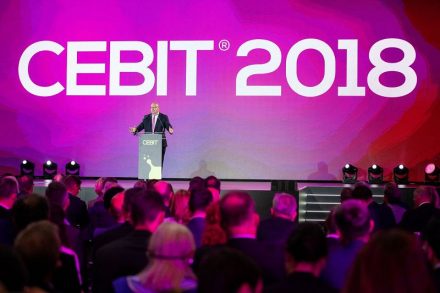
What companies and society will actually do with AI, robotics, Smart Data and unmanned drones remains to be seen. Everything they already make possible is exhibited impressively at Cebit.
Robot after robot
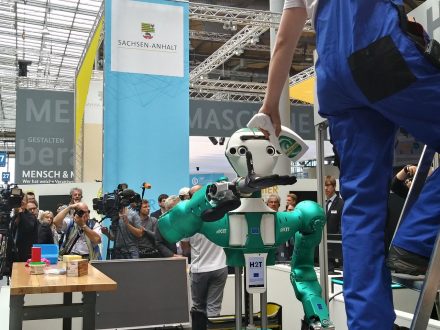 One example is the KIT project “SecondHands.” The humanoid assistant robot, developed in part by the Karlsruhe Institute of Technology (KIT), works hand in hand with humans in workshops. It recognizes if someone needs assistance, responds to voice commands and learns continuously with AI.
One example is the KIT project “SecondHands.” The humanoid assistant robot, developed in part by the Karlsruhe Institute of Technology (KIT), works hand in hand with humans in workshops. It recognizes if someone needs assistance, responds to voice commands and learns continuously with AI.
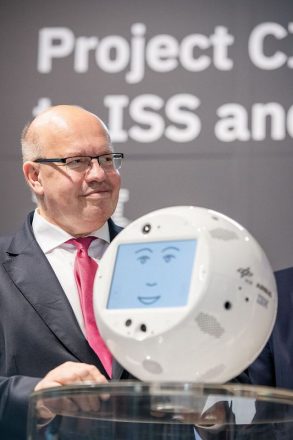
Another impressive product is the AI-based interactive air steward that was developed by IBM and Airbus on behalf of the German Aerospace Center (DLR) for the International Space Station ISS. The “natural” astronaut assistant by the name of Cimon (Crew Interactive Mobile Companion) can interpret moods and emotions and improves its reactions with a combination of Deep Learning and Machine Learning.
A visit to SoftBank Robotics also demonstrated how easy it is to interact with humanoid robots like “Pepper.” The otherwise pleasant robot did turn red, however, due to some communication difficulties caused by the noise level of the fair. And there are indeed quite a few stands featuring similar service robots, since they can be used to demonstrate an array of IoT and Chatbot services. One thing is clear: Pepper is certainly a crowd pleaser.
Future Mobility has its own exhibition hall
Now from robots to autonomous mobility. While there might not be any driverless busses yet to take visitors from one side of the fair to the other, there are tons of autonomous machines to be seen in the actual exhibition halls. One example is e.GO Mobile, which constructed a large test course for its small e-car. Their larger model, the “people mover,” can carry 15 passengers. Yet it will still be a while until the vehicle is able to drive autonomously on the road. The bus, however, can be on the road already in theory. According to company CEO Günther Schuh, it already “learned” enough during a short training period of three to four months. Nevertheless, he still thinks it will take a few years for the general public to understand and accept that autonomous driving is safer than traveling with a human driver.
Startups — the secret stars of the show?
So what are the roughly 350 startup exhibitors doing at the show? It depends on what stage they are in, but most are located in the scale11 hall. Many of them can be found displayed on official stands belonging to ministries or federal states, such as the Munich startups accu:rate and Qolware. They can also be found in other halls where they are presenting alongside associations. All of these options are a cost effective way to present yourself to an international audience. And what do the companies have to gain? We asked Fabio Marti, Director of Business Development at the Munich startup Brabbler:
What do you expect to gain from Cebit?
In essence, we want to exhibit our product and receive feedback. We want to see how our clientele reacts to [note from editorial team: the messenger] ginlo. This is the first time we’ve presented it to the public. It’s a kind of smoke test for us. In concrete terms, we would also like to establish contacts with customers.
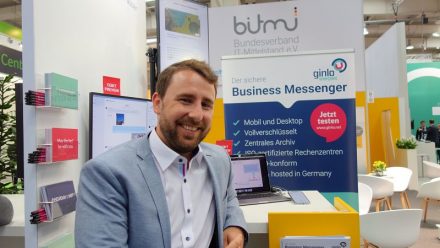
Do you think you will close deals here?
I don’t think that we’ll close any deals. This is where you take the first steps, since that is how things work in B2B business. It’s about establishing contacts. We are focused on the German-speaking market, but have been bilingual from the start in German and English. That also gives us the opportunity to see if there is any reaction from the international market.
Are big fairs a good place for startups?
It is of course difficult if you want to make lots of appointments ahead of time. A certain level of awareness needs to have already been established beforehand. An interesting element here is what you might call walk-in customers. They give you direct feedback, which makes this the right place to be.
Thank you, Fabio!
The Cebit Innovation Award and ministerial visitors
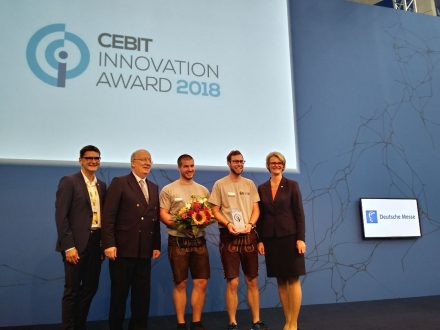
Another way to gain an amount of attention is to have lots of visitors at your stand. The Munich startup Crashtest Security was able to take advantage of just that. Federal Research Minister Karliczek honored the young company with the Cebit Innovation Award and learned more about the product at the stand afterwards. What did the startup think of it all? The lederhosen-clad founders hope it will increase publicity and attract more interest in the startup over the next few days.
Janosch Meier, co-founder of Crashtest Security commented:
Do you already know what you’re going to do with the cash prize?
We came in second place, which is worth 30,000 euros. We are going to use it to continue to expand our company. For example, we are looking for someone for sales right now. We could really use the money for that.
And what was it like for you to explain your product to the minister just now?
That is a normal trade show situation. I try to explain it in a way that makes sense even for a non-techie.
Today is the last day of Cebit. How has it started off?
I already had two positive talks with customers. The goal we set ourselves was for each of us to talk to 15 people every day. So we still have some room for improvement. But we’ll see what the next few hours and days have in store.
Thank you, Janosch, and we wish you continued success!
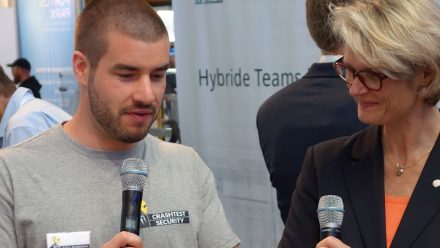
A stroll through the startup hall revealed that the fair started quietly, but then started to fill up around noon. Many of the exhibiting founders are optimistic about making good business leads and increasing their visibility by being at Cebit. The founders often utilize more than just the stand and participate in events that reach a broader audience, such as specialist lectures or panel discussions, to put the spotlight on their companies. Other startups are a bit more reserved in their approach and would rather wait to see how — and if — the new Cebit concept works.
Learn, trust, collaborate
As a result, the mood at Cebit swings between excitement and restraint. Revolutionary innovations are celebrated. The same buzzwords can be heard at every stand and on every stage: about how important learning and skills are — for machines and humans. That trust is the only way to get the general public to accept technology — and how it is up to companies and politics to work on just that. And the most popular buzzword is: collaboration. Across all borders, across all industries and across all fossilized structures. After all, Cebit is and remains — despite concerts and shows — a trade fair where business is to be done.
